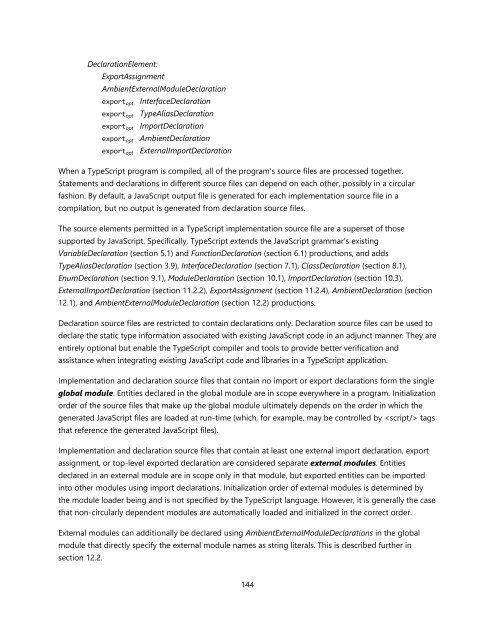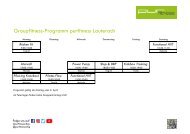TypeScript Language Specification v1.5
TypeScript Language Specification v1.5
TypeScript Language Specification v1.5
Create successful ePaper yourself
Turn your PDF publications into a flip-book with our unique Google optimized e-Paper software.
DeclarationElement:<br />
ExportAssignment<br />
AmbientExternalModuleDeclaration<br />
export opt InterfaceDeclaration<br />
export opt TypeAliasDeclaration<br />
export opt ImportDeclaration<br />
export opt AmbientDeclaration<br />
export opt ExternalImportDeclaration<br />
When a <strong>TypeScript</strong> program is compiled, all of the program's source files are processed together.<br />
Statements and declarations in different source files can depend on each other, possibly in a circular<br />
fashion. By default, a JavaScript output file is generated for each implementation source file in a<br />
compilation, but no output is generated from declaration source files.<br />
The source elements permitted in a <strong>TypeScript</strong> implementation source file are a superset of those<br />
supported by JavaScript. Specifically, <strong>TypeScript</strong> extends the JavaScript grammar's existing<br />
VariableDeclaration (section 5.1) and FunctionDeclaration (section 6.1) productions, and adds<br />
TypeAliasDeclaration (section 3.9), InterfaceDeclaration (section 7.1), ClassDeclaration (section 8.1),<br />
EnumDeclaration (section 9.1), ModuleDeclaration (section 10.1), ImportDeclaration (section 10.3),<br />
ExternalImportDeclaration (section 11.2.2), ExportAssignment (section 11.2.4), AmbientDeclaration (section<br />
12.1), and AmbientExternalModuleDeclaration (section 12.2) productions.<br />
Declaration source files are restricted to contain declarations only. Declaration source files can be used to<br />
declare the static type information associated with existing JavaScript code in an adjunct manner. They are<br />
entirely optional but enable the <strong>TypeScript</strong> compiler and tools to provide better verification and<br />
assistance when integrating existing JavaScript code and libraries in a <strong>TypeScript</strong> application.<br />
Implementation and declaration source files that contain no import or export declarations form the single<br />
global module. Entities declared in the global module are in scope everywhere in a program. Initialization<br />
order of the source files that make up the global module ultimately depends on the order in which the<br />
generated JavaScript files are loaded at run-time (which, for example, may be controlled by tags<br />
that reference the generated JavaScript files).<br />
Implementation and declaration source files that contain at least one external import declaration, export<br />
assignment, or top-level exported declaration are considered separate external modules. Entities<br />
declared in an external module are in scope only in that module, but exported entities can be imported<br />
into other modules using import declarations. Initialization order of external modules is determined by<br />
the module loader being and is not specified by the <strong>TypeScript</strong> language. However, it is generally the case<br />
that non-circularly dependent modules are automatically loaded and initialized in the correct order.<br />
External modules can additionally be declared using AmbientExternalModuleDeclarations in the global<br />
module that directly specify the external module names as string literals. This is described further in<br />
section 12.2.<br />
144


















